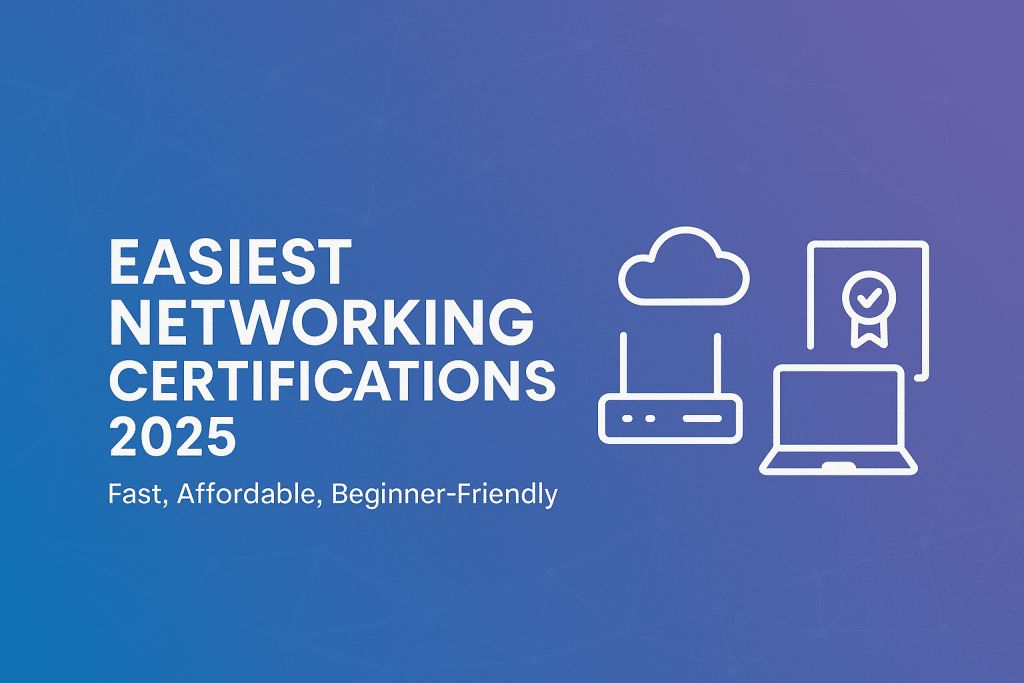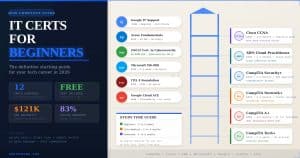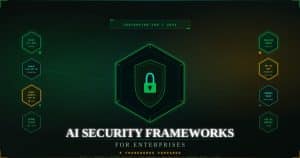The whole “networking certs” talk and the required networking knowledge can feel overwhelming. Everyone’s throwing around big names like Cisco, CompTIA, or Microsoft, and you are here wondering if you’re even qualified to dip your toes in this field and perhaps consider roles in desk support . Spoiler alert: you are.
Networking certs work like a stamp of approval. Depending on the cert, they show you have got the basics down or more. Employers trust them because they’re standardized and industry-approved. Plus, they’re often way cheaper and faster than a degree. Perfect if you’re itching to start working ASAP.
Let’s discuss the easiest networking certifications for beginners.
| Certification | Focus Area | Key Skills Gained | Preparation Time | Cost | Starting Salary (2026) |
| CompTIA Network+ | General Networking Basics | Networking concepts, troubleshooting, setting up and securing networks | 2-3 months (10-15 hrs/week) | ~$358 (Exam fee) | $45,000 – $60,000 |
| Cisco Certified Technician (CCT) | Cisco Device Maintain Network Engineer | Identifying and troubleshooting Cisco hardware, configuring settings, routing and switching basics | 1-2 months | ~$125 (Exam fee) | $40,000 – $50,000 |
| Google IT Support Professional | IT Support and Networking Basics | Networking, IT troubleshooting, security basics, customer support, operating systems | 4-6 months (self-paced) | ~$39/month (Coursera) | $40,000 – $55,000 |
| Microsoft Azure Fundamentals | Cloud Networking and Services | Cloud computing concepts, virtual networks, subnets, security, cost optimization | 1-2 months | $99 (Exam fee) | $45,000 – $60,000 |
| Certified Wireless Network Administrator (CWNA) | Wireless Networking | Wireless network design, Wi-Fi protocols, RF basics, wireless security, troubleshooting | 2-3 months | ~$150 (Exam fee) | $50,000 – $70,000 |
Top Certifications for Networking Newbies
When you’re just starting out in networking, the sheer number of certifications can be overwhelming. Some sound like they require a degree in rocket science, but don’t worry, there are certs out there that are designed with beginners in mind. They give you the essentials without drowning you in technical jargon or assuming you already know stuff.
If you want a quick overview of today’s top networking certifications, this guide breaks them down for beginners. For a broader comparison, you can also explore the best networking certifications in 2026 to see which ones fit your career goals.
Here’s a deep dive into some beginner-friendly options that can kickstart your networking career.
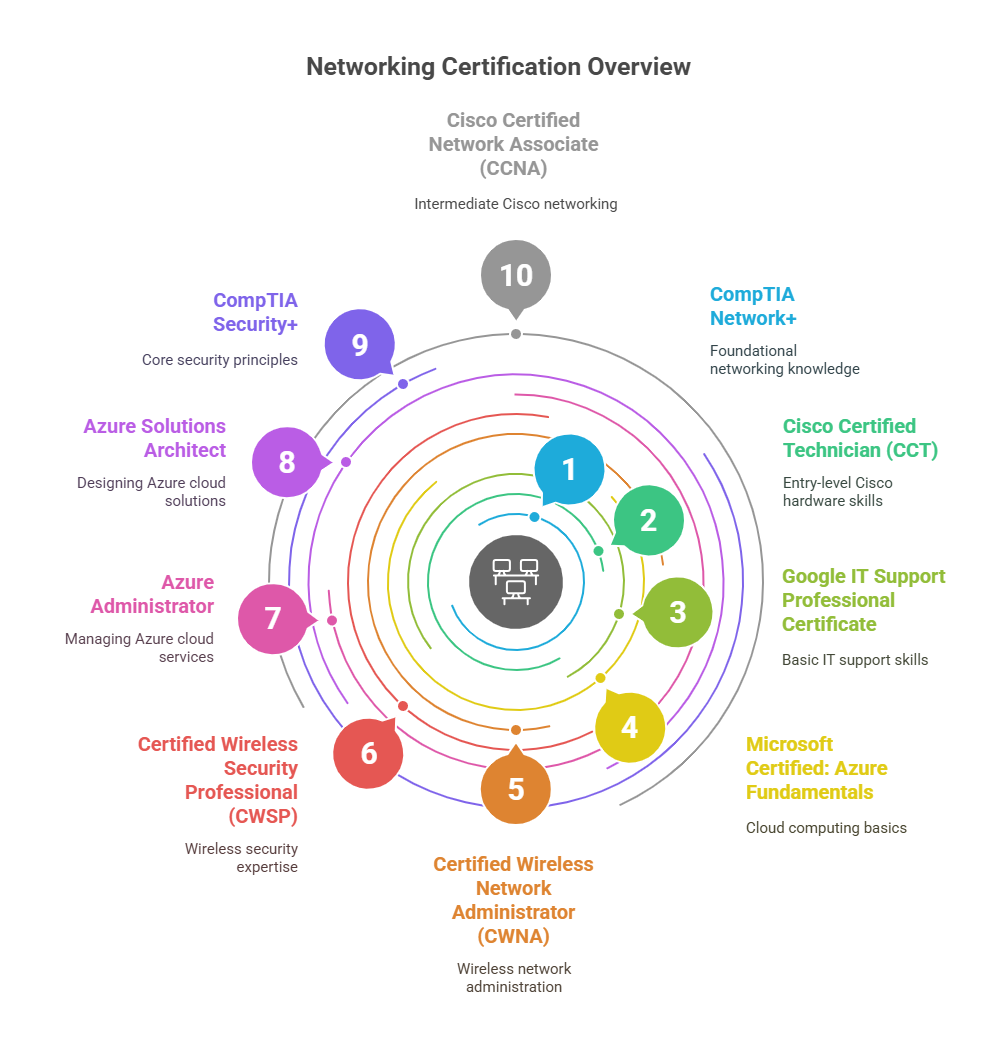
1- CompTIA Network+
If you’re new to networking and wondering where to begin, CompTIA Network+ is often the first name that pops up. It’s been around for years and has earned a reputation as a solid entry-level cert that teaches you the basics without making your head spin.
One reason this cert stands out is that it’s vendor-neutral. This means you’re not tied to learning just Cisco, Juniper, or any other company’s specific equipment. Instead, you get a broader understanding of how networking works in general. It’s like learning the rules of the game before picking a team.
Another reason? It covers both wired and wireless networking. So whether you’re dealing with Ethernet cables or setting up Wi-Fi, Network+ has you covered.
Skills You’ll Walk Away With
Network+ isn’t about fluff, it’s about real-world, practical skills. Here’s what you’ll be able to do once you’ve earned this cert:
- Understand Basic Networking Concepts: You’ll learn how networks connect, what protocols make them run, and what makes them break. Stuff like TCP/IP, DNS, and DHCP will start sounding less like alphabet soup.
- Troubleshoot Issues Like a Pro: When something goes wrong (and trust me, it always does), you’ll know how to figure out what’s causing the problem and fix it. Whether it’s a bad cable, a misconfigured router, or a faulty switch, you’ll be equipped to handle it.
- Set Up Simple Networks: From connecting a few devices to configuring a small office network, you’ll know what to do. This includes working with routers, switches, firewalls, and wireless access points.
- Secure a Network: You’ll learn the basics of network security, like setting up firewalls, spotting vulnerabilities, and keeping hackers out.
These are all job-ready skills for networking professionals, which is why Network+ often gets you a ticket to entry-level IT roles. If you’d like a deeper breakdown of the latest exam update, check out this detailed CompTIA N10-009 Network+ certification guide. You can strengthen your prep with free Network+ exam questions that reflect the latest N10-009 update.
Time Commitment and Exam Format, Breaking It Down
How long does it take to prepare for the Network+ exam? That depends on you. If you’re starting from scratch, expect to spend around 2-3 months studying. But if you already have some basic IT knowledge, you might need less time. On average, putting in 10-15 hours per week is enough to feel confident when test day rolls around.
The exam itself is pretty straightforward. Here’s what you can expect:
- Number of Questions: Up to 90 questions, but don’t panic, it’s a mix of multiple-choice and performance-based questions. The latter means you’ll do some hands-on stuff, like configuring a device or troubleshooting a simulated network issue.
- Time Limit: 90 minutes. It’s a tight window, but manageable if you’re well-prepared.
- Passing Score: 720 out of 900.
The best way to prep? Combine study guides with hands-on practice. Use tools like packet tracers or lab simulators to get a feel for real-world scenarios. And don’t forget practice tests on security fundamentals , they’re a great way to gauge how ready you are.
What kind of salary can you expect From Network+?
One of the big questions everyone asks: “How much money can I make with this cert?” The answer? It depends on your role and where you’re working.
In 2026, entry-level roles for Network+ certified professionals, like help desk techs or junior network admins, are offering salaries in the range of $45,000 to $60,000 per year. Curious what comes after that? Check out the highest-paying networking jobs to see where the real money is. If you’re in a city with a high demand for IT talent, that number can climb even higher. And once you gain experience and stack a few more certs, six-figure salaries aren’t out of reach.
2- Cisco Certified Technician (CCT)
If you’ve ever thought about stepping into networking, chances are you’ve heard of Cisco. They’re the big player in this space, with their equipment running everything from small office setups to massive enterprise systems. The Cisco Certified Technician (CCT) is a great place to start for beginners who want to get familiar with Cisco’s tech.
What Do You Learn With CCT?
The CCT cert has a practical, no-nonsense approach. It’s all about giving you the skills you need to deal with Cisco equipment. Here’s a quick look at what you’ll be diving into:
- Hardware Basics: Recognizing different Cisco devices and understanding their purpose. You’ll know what a router is, what a switch does, IP connectivity, and how to spot the blinking lights that scream “something’s wrong.”
- Installing and Replacing Parts: Sometimes, the fix is as simple as swapping out a broken piece of hardware. CCT teaches you how to safely do that without frying the whole device.
- Configuring Basic Settings: You’ll learn to access a device’s setup and tweak things like IP addresses and default configurations.
- Troubleshooting Connectivity: If a network goes down, you’ll know how to pinpoint if it’s a device issue or something else.
What’s the Exam Like?
Cisco knows this cert is for beginners, so they’re not going to hit you with super-hard questions. But you’ll still need to prep.
- Number of Questions: You’ll face around 55-65 questions.
- Format: It’s mostly multiple-choice, with some “choose all that apply” and “match the correct term” type questions.
- Duration: The exam is 90 minutes. That’s plenty of time, as long as you’re not spending 10 minutes panicking over each question.
- Passing Score: Cisco doesn’t officially share the passing score, but it’s generally around 80%.
What Can You Earn With a CCT Cert?
The CCT cert is entry-level, so don’t expect six figures right out of the gate. But it’s still a great way to get your foot in the door. Most jobs that require a CCT cert are support roles; think network technician, field engineer, or hardware support tech.
In 2026, starting salaries for CCT-certified professionals hover around $40,000 to $50,000 annually. That might not sound huge, but it’s just the beginning. The experience you gain with this cert can lead to bigger roles, especially if you stack it with certs like the CCNA 200-301 exam prep, which is the industry’s next big milestone. And as you move up, the paychecks get bigger, with mid-level roles averaging $70,000 or more especially if you prep with CCNA 200-301 dumps before sitting the exam. Ypu can also check out these free CCNA 200-301 practice questions to sharpen your Cisco networking fundamentals.
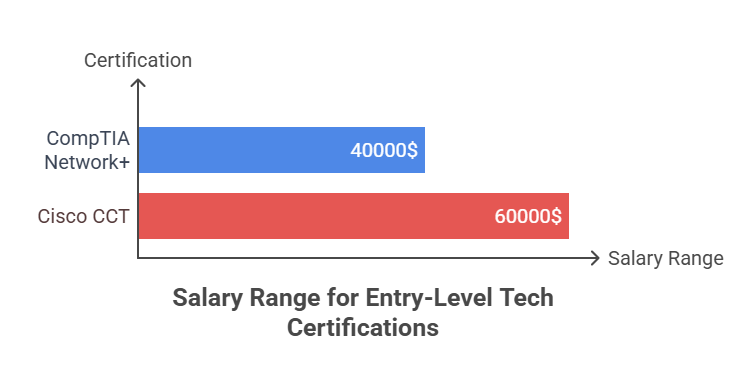
3- Google IT Support Professional Certificate
If you’ve been curious about working in tech but feel like you don’t have the skills, the Google IT Support Professional Certificate is practically made for you. Unlike many certs that assume you already know the basics, this one is designed for people starting from scratch. It’s perfect if you want to dip your toes into networking while also learning about other IT essentials.
Google knows how to simplify things, and they’ve nailed it with this program.
What You’ll Learn
Even though it’s marketed as an IT support cert, it includes a solid intro to networking. It’s like killing two birds with one stone, you get foundational knowledge about how computers, networks, and security concepts data center technologies work while also picking up skills for troubleshooting and managing IT systems.
Here’s a breakdown of the key topics covered:
- Networking Basics: Understand how devices connect, what makes them communicate, and why some setups fail. Think of it as Networking 101, simplified for newcomers.
- IT Troubleshooting: Learn the step-by-step process of solving common tech problems, whether it’s a connectivity issue or a hardware failure.
- Security Basics: Get familiar with protecting networks and systems from basic threats like malware and phishing.
- Operating Systems: Whether it’s Windows, Linux, or even macOS, you’ll understand how these systems function and how to fix common issues.
- Customer Support Skills: IT isn’t just about tech—it’s also about working with people. You’ll learn how to communicate clearly and help users solve problems efficiently.
The networking segment is beginner-friendly but doesn’t water things down too much. You’ll walk away understanding concepts like IP addresses, DNS, firewalls, and basic wireless setups.
What Kind of Jobs and Pay Can You Expect?
Here’s where it gets exciting. This cert is a direct path to entry-level IT jobs. You won’t be earning six figures right away, but you’ll get your foot in the door, which is the hardest part.
Roles like IT support specialist or help desk tech often pay $40,000 to $55,000 per year to start. That might not sound like a fortune, but it’s a great starting point, especially if you’re switching careers or just getting into tech. For anyone who wants to pivot this support experience into hospital IT, our Epic certification guide shows how to move into electronic health-record roles.
As you gain experience and add more certs to your resume (like CompTIA Network+ or Security+), your earning potential grows. Mid-level roles like systems admin or network technician that involve network assurance can bring in $60,000 to $80,000 annually, and that’s without needing a degree.
4- Microsoft Certified: Azure Fundamentals
If there’s one cert that’s caught everyone’s attention recently, it’s Microsoft’s Azure Fundamentals. With the shift to cloud computing becoming the norm, learning about cloud services is no longer optional, it’s necessary.
This cert is where you start. It’s simple, straightforward, and perfect for beginners who want to get a grip on how Azure works, especially for aspiring networking professionals. , especially in terms of cloud security and networking. Don’t let the word “fundamentals” fool you; this cert packs a lot of punch for entry-level learners.
What Does Azure Fundamentals Teach You?
Azure Fundamentals is all about the basics, but it’s not just random theory. It’s designed to give you skills you can actually use. Here’s what you’ll walk away with:
- Cloud Concepts: You’ll learn what the cloud is, why businesses use it, and how it works in simple, practical terms.
- Azure Networking: Basics like virtual networks (VNets), subnets, and how to manage IP addresses in Azure. It’s like learning traditional networking but for the cloud.
- Cost Management: An introduction to pricing models and cost optimization in Azure. This isn’t just technical; it’s valuable for decision-making in real-world jobs.
- Security Basics: How to keep networks safe in a cloud environment. Things like setting up firewalls and understanding compliance.
The networking section is where you’ll dive into VNets, which are the cloud equivalent of your typical physical network. You’ll learn how to set up private networks, connect them to other cloud services, and manage their configurations. Boost your confidence with free AZ-900 practice test that mirror real test scenarios.
What’s the ROI of This Cert?
When we talk about the return on investment (ROI) of Azure Fundamentals, it’s less about the money and more about the doors it opens. This cert positions you as someone who understands the basics of cloud services, and with the way businesses are adopting Azure, that’s a big deal.
The salary for roles that align with this cert, especially in data centers, varies, but here’s a general idea:
Entry-Level Jobs: If you’re starting as a cloud support technician or IT help desk tech with Azure Fundamentals, expect around $45,000 to $60,000 annually.
Advancing with More Certs: Add on something like Azure Administrator or Azure Solutions Architect, and you’re looking at mid-level roles paying anywhere from $70,000 to $110,000 annually, particularly those involving network virtualization .
5- Certified Wireless Network Administrator (CWNA)
If you’ve ever wondered how your Wi-Fi connects seamlessly or why it fails in some corners of the house, the answer lies in wireless networking.
It’s a part of IT that’s becoming more important every day, and the Certified Wireless Network Administrator (CWNA) cert is a great way to get started.
This cert focuses entirely on wireless technology, which makes it different from many general networking certs out there. If you love the idea of diving into wireless tech and exploring networking solutions without getting bogged down by too much jargon, CWNA could be your best bet.
What You Learn with CWNA
The CWNA covers everything you need to know about wireless networking, and it goes deeper than just connecting to a Wi-Fi signal. Here’s a breakdown of what you’ll learn:
- Radio Frequency (RF) Basics
You’ll start by understanding how wireless signals work. This includes concepts like frequency, amplitude, and how data travels through the air. It’s foundational knowledge that makes everything else click. - Wi-Fi Standards and Protocols
Ever heard of 802.11? If not, you will. You’ll learn about the different Wi-Fi standards, how they’ve evolved, and what each one is used for. - Wireless Network Design
Setting up a network isn’t just plugging in a router. You’ll learn how to plan coverage areas, avoid interference, and optimize for speed and reliability. - Security for Wireless Networks
Security is huge in wireless. You’ll dive into encryption methods, authentication protocols, and ways to keep intruders out of your network. - Troubleshooting Wireless Issues
No network is perfect. CWNA teaches you how to identify and fix common problems like dropped connections, interference, or slow speeds.
What Kind of Jobs Can You Get With CWNA?
CWNA opens up a variety of roles in IT, especially those focused on wireless networking or network access and networking fundamentals. Some of the jobs you can aim for include:
- Wireless Network Administrator: Managing and maintaining Wi-Fi networks in offices, campuses, or public spaces.
- Wireless Support Specialist: Troubleshooting issues and supporting teams that rely on wireless connectivity.
- Wi-Fi Analyst: Analyzing and optimizing networks to improve performance.
- Field Engineer: Setting up and testing wireless equipment on-site.
These roles often involve hands-on work with wireless devices, so it’s a great cert if you enjoy practical tasks rather than sitting behind a desk all day.
What About the Pay?
The CWNA cert qualifies you as a network engineer for entry to mid-level roles, so salaries are respectable and grow with experience for these entry level certifications. Starting salaries for wireless networking roles, which may include network virtualization skills or the ability to maintain solarwinds network , typically range from $50,000 to $70,000 per year. As you gain experience and stack additional certs like CWSP (Certified Wireless Security Professional), you can expect that number to climb to $90,000 or more annually.
If you’re working in a metro area or for a company with high wireless demands, the pay can go even higher. And the best part? Wireless is a niche skill set, so you’ll often find less competition compared to more general networking roles.
How to Quickly Prepare for Entry-Level Networking Certs?
Most entry-level certs like CompTIA Network+, Cisco Certified Technician (CCT), or Google IT Support Professional are designed to be approachable. You just need a plan, the right resources, and a bit of commitment to study for the best networking certifications . Let’s dive into how you can make this process less stressful and more effective.
Breaking Down Networking Concepts Without Overwhelming Yourself
Networking is full of terms that sound confusing at first IP addresses, subnets, protocols, packets. It’s easy to feel like you’re drowning in jargon. The trick is to break it into manageable pieces and not try to learn everything at once.
Stick to the “need-to-know” stuff at first. You don’t have to memorize every single detail; focus on grasping the overall idea. Once you get a sense of how networks operate, everything else will make more sense.
Leveraging Online Resources and Free Study Materials
There’s no need to blow your savings on expensive courses when prepping for an entry-level cert. The internet is a goldmine of free and low-cost resources. Here’s what to look for:
- Vendor-Provided Learning Platforms: Most cert providers, like CompTIA and Cisco, offer free or affordable learning paths. These are tailored to the cert you’re studying for and cover exactly what you need to know.
- Free PDFs and Study Guides: Websites like Cybrary and TechExams often have downloadable guides. They might not be fancy, but they’re packed with useful info.
- Practice Questions: Start testing your knowledge early with free quizzes and mock exams. They’re great for identifying areas where you need to focus more.
Simulated Labs and Hands-On Practice
If you want to really “get” networking, you need to do more than read about it, you have to get your hands dirty. Simulated labs are one of the best ways to do this without needing expensive equipment.
- Use Virtual Lab Tools: Platforms like Cisco Packet Tracer or GNS3 let you simulate network setups and troubleshoot issues. These tools are super beginner-friendly and mirror real-world scenarios.
- Set Up Your Own Mini-Network: If you’ve got an old router or switch lying around, use it. Practice configuring settings, connecting devices, and troubleshooting issues. Even setting up a home Wi-Fi network teaches you useful skills.
- Try Cloud-Based Labs: Services like AWS or Azure often have free tiers. You can experiment with virtual networks in a cloud environment, which is becoming increasingly relevant for modern IT jobs.
Hands-on practice not only helps you learn faster, but it also builds your confidence. The first time you fix a connection problem on your own, especially related to network security you’ll feel like a tech wizard.
Exam Dumps by Cert Empire
Exam dumps are often misunderstood but can be a helpful tool when used responsibly. Platforms like Cert Empire offer updated dumps for cert exams including focused N10-009 dumps for the newest Network+ version and you can download N10-009 exam dumps to sharpen your practice even further.
Their dumps are updated frequently and tend to reflect the latest exam formats. Unlike shady dumps floating around online, Cert Empire has a reputation for accuracy and reliability.
FAQs: Your Beginner Networking Certification Questions Answered
What is the easiest networking certification to get?
CompTIA Network+ is widely regarded as the easiest cert due to its beginner-friendly content, which certification validates but options like CCT and Google IT Support Professional Certificate are also manageable for newcomers, some others include Cisco certified network associate, cisco certified network professional, certified network associate CCNA certification for networking technologies.
How long does it take to prepare for an entry-level networking certification?
Preparation typically takes 1-3 months, depending on the cert and your schedule, with Network+ and CCT being faster to complete than broader programs like Google IT Support Professional Certificate.
Are networking certifications worth it for beginners?
Yes, they provide essential skills, improve job prospects, and offer entry into IT roles and network administration with salaries starting around $40,000 to $60,000.
Do you need a technical background for beginner networking certifications?
No, most beginner certs like Network+ and Google IT Support Professional assume no prior experience and are designed for complete beginners.
What are the cheapest beginner networking certifications in 2026?
Affordable options include Google IT Support Professional Certificate (under $200) and Microsoft Azure Fundamentals ($99 exam fee), with free study resources often available.

